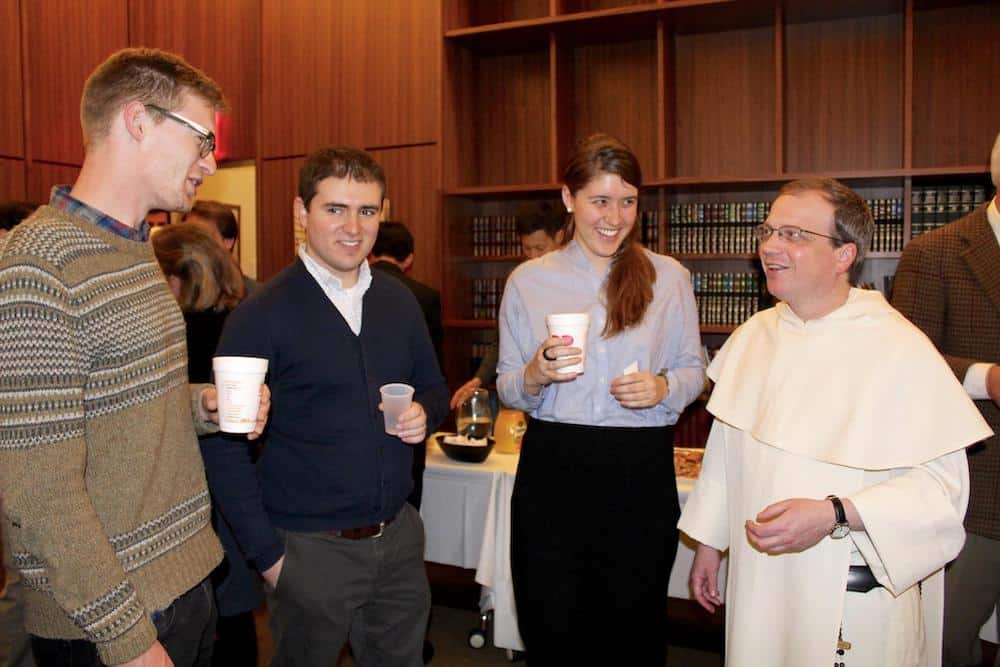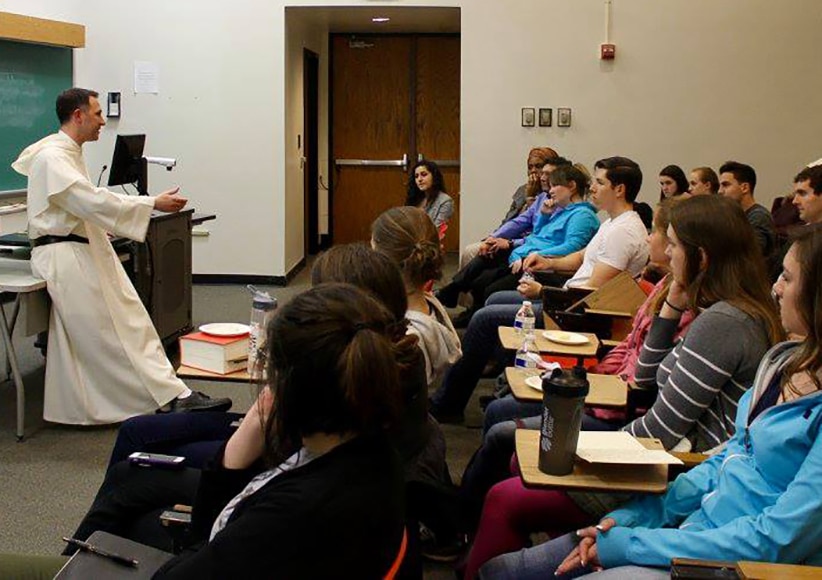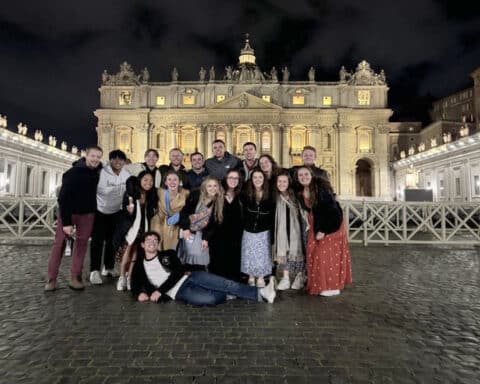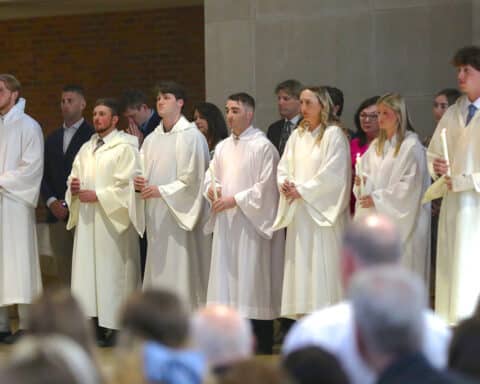The Order of Preachers has been a fixture in the Catholic intellectual tradition since its founding in the 13th century. The white-habited friars with their occasional black capes have become synonymous with the life of the Catholic university and scholarship. The Thomistic Institute is continuing this rich tradition at colleges throughout the English speaking world.
The Order of Preachers, commonly known as the Dominicans after the founder, St. Dominic de Guzman, were founded in 1216. One of the largest and most significant religious orders in the Church’s history, the Dominicans have produced numerous saints and blesseds, including St. Catherine of Siena, St. Martin de Porres and St. Thomas Aquinas.
The Thomistic Institute is associated with the Dominican House of Studies in Washington, D.C. Originally founded in 2009 as an institute for academic research, it quickly evolved into what it is today, promoting and fostering the Catholic intellectual tradition on numerous college campuses. The Institute’s inaugural director was Father Thomas Joseph White, O.P., who served from 2009 to 2018. He was succeeded by Father Dominic Legge, O.P., who is the present director.
The Institute “exists to promote Catholic truth in our contemporary world by strengthening the intellectual formation of Christians at universities, in the Church, and in the wider public square,” according to its website. “The thought of St. Thomas Aquinas, the Universal Doctor of the Church, is our touchstone.”
Students asking big questions
The Thomistic Institute currently has chapters at nearly 100 campuses across the United States, England and Ireland. These chapters are on-campus academic clubs, which are formed by the students and run by the students, with occasional guidance and programming assistance from the Thomistic Institute staff. Through sponsored lectures, seminars and reading groups, the chapters serve to help students seek answers to their deepest questions.
“Students in our colleges today want answers to some of the most poignant questions of religion, theology, philosophy and science,” said Joe Murray, the lead campus programs coordinator at the Thomistic Institute.
The Institute’s work is meant to meet this challenge, and to help students come to find the answers they seek. Such authentic seeking is sorely lacking on many college campuses, quite contrary to the great tradition of the university. “The Christian intellectual tradition, and in particular the tradition proceeding from the work of Thomas Aquinas, has the resources to answer the questions which students desire to ask.”
There is an “enormous wealth of scholarship that exists in answer to these questions,” Murray said, but it is uncommon today for colleges to provide students with access to this treasury.
The forming of chapters happens at the initiative of the students. The students form a leadership team, under the guidance of Thomistic Institute staff, and get recognition as a student group from their university.
This is not to say that the Thomistic Institute is merely rear-facing, looking only to those great minds who have come before us. In fact, Murray’s work focuses on bringing Catholic intellectuals to the campus chapters. A wide array of speakers have been featured, including the prominent Scottish philosopher Alasdair MacIntyre; English philosopher Sir Roger Scruton; Father Wojciech Giertych, O.P., the Theologian of the Pontifical Household (a position also known as “The Pope’s Theologian” and traditionally held by Dominicans); Supreme Court Justice Neil Gorsuch; and many more.
The Institute hosts these lectures, as well as retreats, reading groups and academic conferences for college students interested in the Thomistic intellectual tradition. The staff assist chapters in starting reading groups, hosting events and forming a community of students interested in Thomas Aquinas, Thomism and Christian intellectual life, according to Murray.
Other resources
In addition to the campus work done by the Thomistic Institute, there is a constant stream of educational content being produced by the friars and other staff members, teaching and promoting the beauty of truth in the Catholic intellectual tradition.
A video series called “Aquinas 101” introduces viewers and listeners to the thought of St. Thomas Aquinas, perhaps the most influential philosophical and theological giant of the last thousand years. The series examines contemporary concerns through the lens of Thomistic thought, applying the thought of St. Thomas Aquinas to issues such as the relationship between faith and modern science, or understanding the sacraments and how they give us grace in our daily lives.

Additionally, the Thomistic Institute Podcast features recordings of many of the lectures organized by the Institute around the country, making them accessible to those beyond the hallowed, ivy-covered halls of college campuses.
The profound scholarly tradition of the Dominicans is ever-present in the Thomistic Institute. In addition to the lectures, podcasts and videos, the Institute also sponsors academic projects such as research, publications, colloquia and more, and provides scholarships to lay students who are studying theology at the Dominican House of Studies.
In 2022 the Institute launched a study abroad program at the Pontifical University of St. Thomas Aquinas (otherwise known as the Angelicum) in Rome. This program is for students from all around the world and involves a deep immersion in the Catholic tradition and history in Rome and its environs.
Working with college students
There are certainly challenges inherent in working with college students. Chief among them is the limited time that students have.
“We realize that there are a large number of extracurriculars competing for students’ time,” said Murray, “so it’s a natural hazard to encounter. However, the students involved with the Thomistic Institute are some of the most committed and intellectually curious students I’ve ever met, and it’s a pleasure to work with and for them.”
It is not only college students who are served by the Institute, either. There are also groups of young professionals, just out of college, who are still intellectually curious and desire meaningful answers to deep questions, who collaborate with the Institute to host conferences and lectures in order to seek those answers. All Thomistic Institute lectures are free and open to the public, and many are made available online so that as many people as possible can benefit from them.
“The students involved with the Thomistic Institute are some of the most committed and intellectually curious students I’ve ever met, and it’s a pleasure to work with and for them.”
— Joe Murray
“Our work serves to give students in our universities today access to the magnificent Christian intellectual patrimony, which they desire and deserve,” Murray said. “By connecting students with high quality theologians, philosophers, scientists and other scholars in the Christian intellectual tradition, we give them the opportunity to pursue an education that will provide them with answers to the most important questions.”





